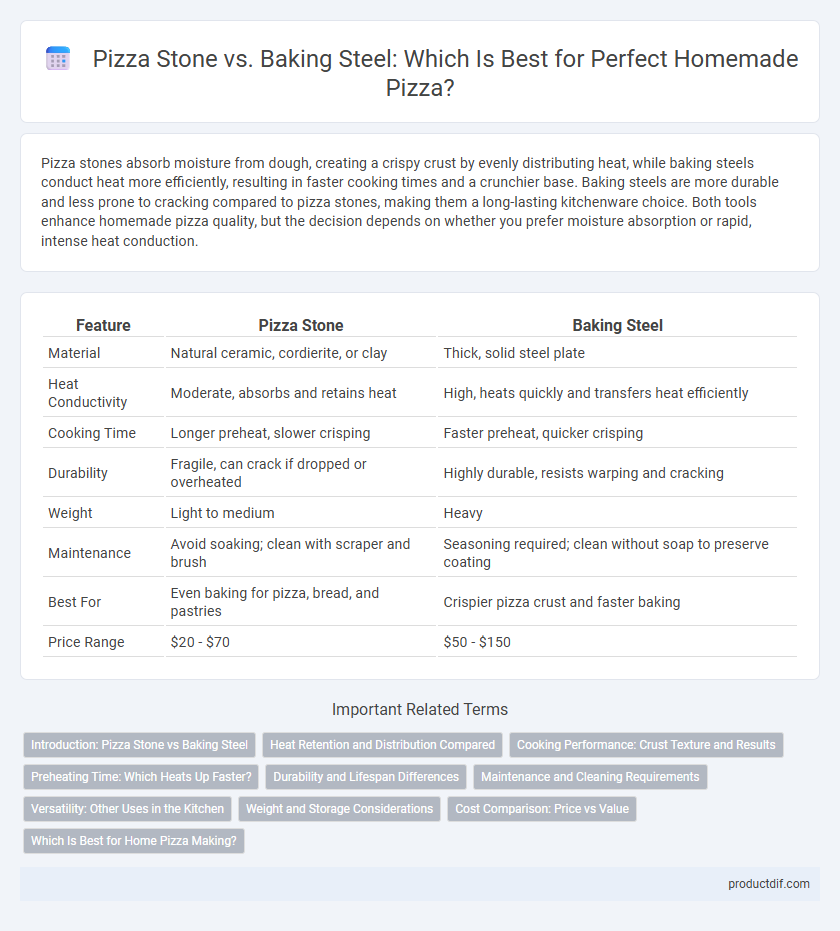Pizza stones absorb moisture from dough, creating a crispy crust by evenly distributing heat, while baking steels conduct heat more efficiently, resulting in faster cooking times and a crunchier base. Baking steels are more durable and less prone to cracking compared to pizza stones, making them a long-lasting kitchenware choice. Both tools enhance homemade pizza quality, but the decision depends on whether you prefer moisture absorption or rapid, intense heat conduction.
Table of Comparison
| Feature | Pizza Stone | Baking Steel |
|---|---|---|
| Material | Natural ceramic, cordierite, or clay | Thick, solid steel plate |
| Heat Conductivity | Moderate, absorbs and retains heat | High, heats quickly and transfers heat efficiently |
| Cooking Time | Longer preheat, slower crisping | Faster preheat, quicker crisping |
| Durability | Fragile, can crack if dropped or overheated | Highly durable, resists warping and cracking |
| Weight | Light to medium | Heavy |
| Maintenance | Avoid soaking; clean with scraper and brush | Seasoning required; clean without soap to preserve coating |
| Best For | Even baking for pizza, bread, and pastries | Crispier pizza crust and faster baking |
| Price Range | $20 - $70 | $50 - $150 |
Introduction: Pizza Stone vs Baking Steel
Pizza stones and baking steels are essential kitchenware for crafting crispy, evenly cooked pizza crusts by retaining and distributing heat effectively. Pizza stones, typically made from ceramic or cordierite, offer excellent heat retention and moisture absorption, creating a crispier texture. Baking steels, constructed from thick steel plates, conduct heat faster and provide superior heat transfer, resulting in a quicker, more consistent bake.
Heat Retention and Distribution Compared
Pizza stones, typically made from ceramic or cordierite, excel in heat retention by absorbing and uniformly holding high temperatures, which results in a crispy crust. Baking steels, composed of thick steel plates, offer superior heat conduction and faster heat transfer, providing even cooking and excellent heat distribution across the surface. Both materials enhance oven performance, but baking steels deliver quicker heat responsiveness while pizza stones maintain steadier, long-lasting heat.
Cooking Performance: Crust Texture and Results
Pizza stones provide excellent heat retention, creating a crisp, evenly baked crust by absorbing moisture during baking. Baking steels conduct heat more efficiently than stones, resulting in faster cooking times and a crispier, more charred crust with superior oven spring. For those seeking a balance of quick heat transfer and optimal crust texture, baking steel offers enhanced cooking performance for artisanal pizzas.
Preheating Time: Which Heats Up Faster?
Baking steel heats up faster than a pizza stone due to its higher thermal conductivity, typically requiring about 30 minutes of preheating compared to the pizza stone's 45 minutes to reach optimal baking temperature. The steel's ability to transfer heat quickly ensures a consistent cooking environment, which is crucial for achieving crisp crusts in homemade pizzas. Choosing baking steel reduces waiting time and improves heat retention efficiency during baking sessions.
Durability and Lifespan Differences
Pizza stones are typically made from ceramic or cordierite, offering good heat retention but are prone to cracking under thermal shock, resulting in a shorter lifespan. Baking steels, constructed from high-quality steel, provide superior durability and resistance to damage while maintaining even heat distribution, ensuring a significantly longer lifespan. The robust nature of baking steel makes it a long-term investment for consistent pizza baking performance compared to the more fragile pizza stone.
Maintenance and Cleaning Requirements
Pizza stones require thorough drying after washing to prevent cracking from moisture retention, while baking steels are less porous and easier to clean, typically needing only a quick wipe down without soaking. Pizza stones can absorb oils and food particles, leading to stains and odors, making regular seasoning unnecessary but careful cleaning essential to maintain durability. Baking steels resist sticking and rust when properly seasoned with oil, reducing the need for intense maintenance compared to the fragile and porous nature of pizza stones.
Versatility: Other Uses in the Kitchen
Baking steels offer superior versatility beyond pizza, excelling in broiling, searing meats, and baking artisanal bread due to their high thermal conductivity and durability. Pizza stones, while effective for crisp crusts, are primarily limited to baking pizzas and bread with gentle heat retention and slower temperature response. Chefs seeking multi-functional kitchen tools often prefer baking steels for their adaptability across various cooking techniques and faster heat transfer.
Weight and Storage Considerations
Pizza stones are typically heavier and more fragile, making them less convenient to move and store compared to baking steels, which are lighter yet highly durable. Baking steels can be stored vertically or horizontally without risk of cracking, whereas pizza stones require careful handling to avoid breakage. Weight differences impact kitchen ergonomics, with baking steels offering better portability and space efficiency for small kitchens.
Cost Comparison: Price vs Value
Pizza stones typically range from $20 to $50, offering an affordable option for even heat distribution and a crisp crust, while baking steels usually cost between $70 and $150 due to their superior heat conductivity and durability. The higher upfront price of baking steels often translates into better long-term value, especially for frequent pizza makers seeking faster cooking times and improved crust texture. Considering cost versus performance, investing in a baking steel can deliver enhanced cooking results that justify the initial expense more effectively than a pizza stone.
Which Is Best for Home Pizza Making?
Pizza stones offer excellent heat retention and create a crispy crust by evenly distributing heat, making them ideal for traditional home ovens. Baking steels, made from solid steel, conduct heat faster and can reach higher temperatures, resulting in quicker cook times and a chewier crust. For home pizza making, baking steel is often preferred by enthusiasts seeking professional-quality results and faster baking performance.
Pizza Stone vs Baking Steel Infographic

 productdif.com
productdif.com